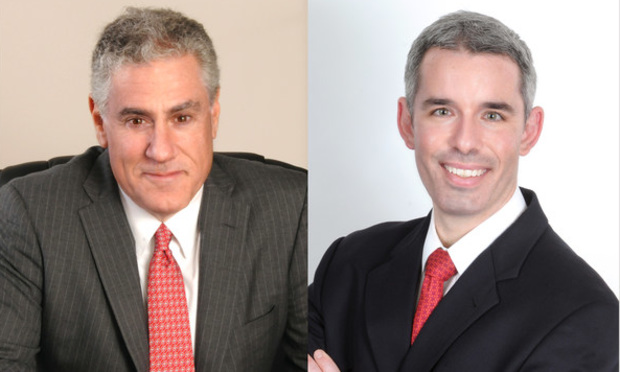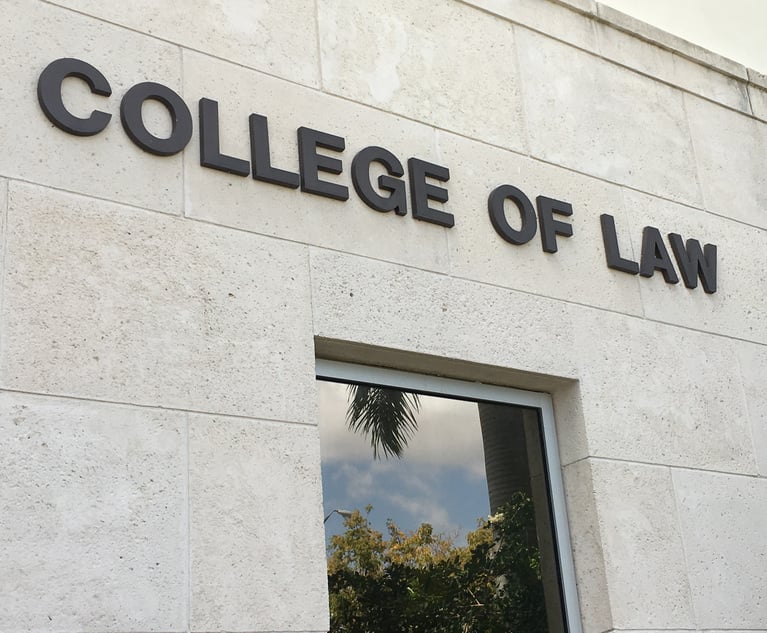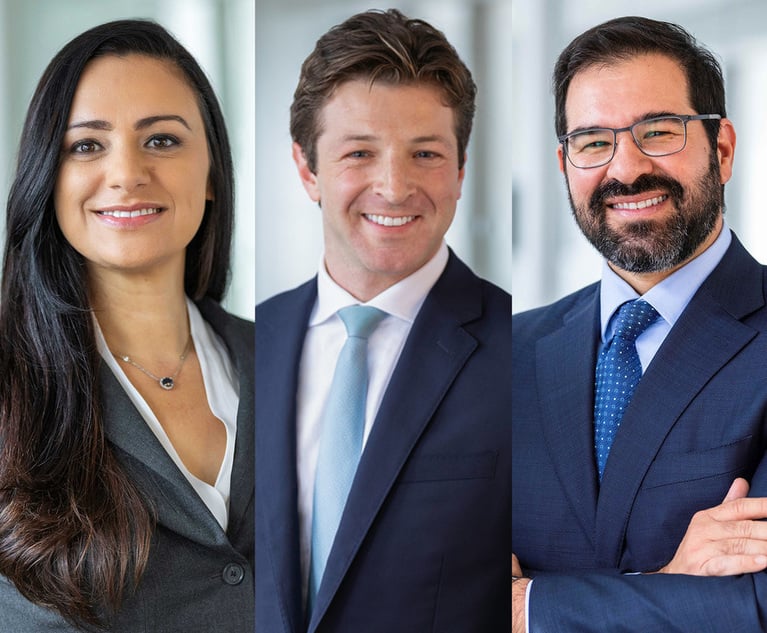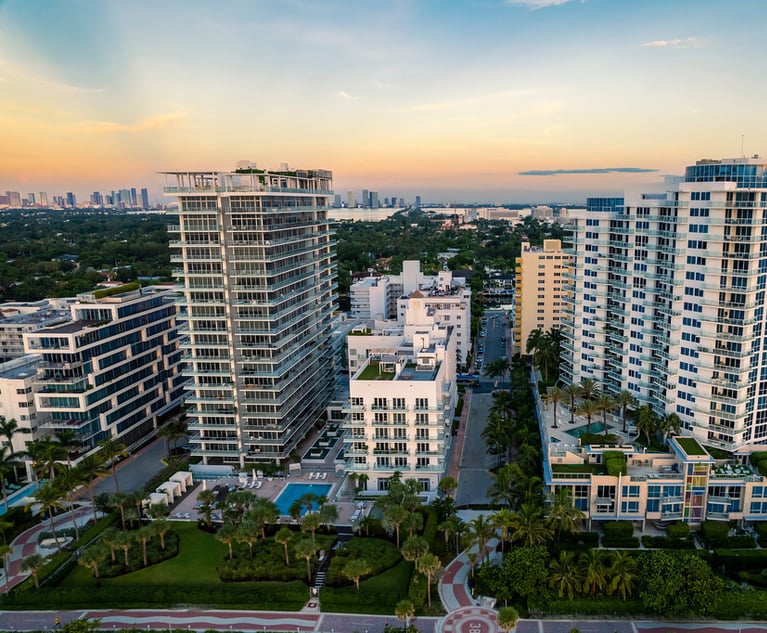Miami Jury Hits Defense With $5.4M Verdict After String of No-Shows
Without the money to pay Fort Lauderdale defense attorney Sean Sheppard to represent him at trial, defendant Chad M. Freeman and his liquidation company Freeman Hammond LLC ended up on the losing side of a $10 million judgment.
February 20, 2019 at 03:01 PM
6 minute read
 A Miami-Dade jury found that Freeman Hammond LLC and its CEO Chad M. Freeman had broken a noncompete agreement by stealing trade secrets. Photo: wavebreakmedia/Shutterstock.com.
A Miami-Dade jury found that Freeman Hammond LLC and its CEO Chad M. Freeman had broken a noncompete agreement by stealing trade secrets. Photo: wavebreakmedia/Shutterstock.com.
When a Miami-Dade jury awarded $5.4 million in damages to a Broward liquidation company Feb. 5, Fort Lauderdale defense attorney Sean P. Sheppard wasn't there. He'd skipped the trial and two mediation sessions at the request of his client, Chad M. Freeman, who said he couldn't afford to defend himself and his South Carolina company Freeman Hammond LLC.
To make matters worse, the judge ordered Freeman's company to pay $4.1 million, for a final judgment of nearly $10 million.
The case stems from a suit by the Recon Group, which refurbishes various goods to resell in bulk, against former employee Freeman in July 2015. He'd been fired and allegedly left with the company's client list, according to the suit, using it to start his own venture despite having signed a noncompete agreement.
It took about a week for The Recon Group's longtime clients to notice, according to outside general counsel Mikhael E. Keifitz in North Miami Beach. They called in, alleging someone else had got in touch, badmouthed the company and tried to sell them the same merchandise.
Cue trial lawyers Michael Sayre and Glen H. Waldman of Waldman Barnett in Miami, who Keifitz drafted in to help with the lawsuit alleging breach of contract, trade secret theft, unfair competition and defamation.
Click here to read the complaint
The defense denied all claims and moved to dismiss the case, arguing that Freeman never signed a noncompete agreement with The Recon Group, and that its customers weren't trade secrets because anyone could find them through a Google search.
Sheppard deferred comment to Freeman, who said he'd had no option but to start his own business after suddenly losing his job but had never taken a client list.
“When you're fired you have to do something pretty quickly,” Freeman said. “What I did quickly was what I knew, which was liquidation.”
The two sides saw things differently and were headed to court. But first, mediation.
In the 10 years Keifitz has managed The Recon Group's legal affairs, he says he's never had a no-show. The first one occurred at a hearing scheduled for 10 a.m. on Jan. 9.
 North Miami Beach attorney Mikhael Keifitz. Courtesy photo.
North Miami Beach attorney Mikhael Keifitz. Courtesy photo.“I'm driving through Miami traffic at 9:15 a.m., I'm almost there and I get an email from counsel saying they're not showing up,” Keifitz said.
According to Keifitz, defense counsel Sheppard emailed to explain that his client hadn't given him permission to attend, and after waiting about 40 minutes the mediator called it a day.
Keifitz then asked Miami-Dade Circuit Judge Barbara Areces to compel mediation in an emergency hearing. And she did, scheduling a Jan. 21 mediation and making it clear that another no-show wouldn't go over well.
“I went to mediation,” Keifitz said. “Again we were there for maybe 40 minutes and again he would not show.”
For Keifitz, it was Sheppard's lack of communication that bothered him more than the no-show.
“We have legal and ethical responsibilities to the Florida Bar,” Keifitz said. “His ethical responsibility is to let other Florida counsels know if he's coming or not, because we spent our time and therefore the client's money.”
'He couldn't do it for free'
According to defendant Freeman, he couldn't afford to defend himself.
“The reason we didn't show up for court is because, as nice as my attorney is, he couldn't do it for free, though he offered me the best price possible to be able to go to court and fight it,” Freeman said. “My wife and I had used two credit cards between the both of us to hire him for a retainer fee. In under no circumstances did we ever in a million years think that it was going to be a $10 million judgment between the company and myself.”
After losing his job, then his business, Freeman's car and replacement motorcycle were repossessed.
At a second emergency hearing, the judge entered a default judgment against the defendants, finding liability, striking their responses and moving for a jury trial to decipher damages — a judgment Areces ruled she couldn't make, since both parties had previously asked for a trial.
Trial attorneys Sayre and Waldman stepped in at the last minute. Sayre had another case set for trial Feb. 4 but it settled three days prior, so he whipped up a verdict form, jury instructions and witness statements ready for The Recon Group's Feb. 5 trial.
About 80 potential jurors were supposed to appear that day, but according to Sayre only six came.
“I got what I got,” Sayre said.
After double-checking that none had signed noncompete agreements, Sayre proceeded.
“It's easier when there's nobody on the other side,” Sayre quipped. “But the jury still had to accept our version of our damages and our facts, and they thankfully did.”
 Glen H. Waldman, left, and Michael A. Sayre, right, of Waldman Barnett in Miami. Courtesy photos.
Glen H. Waldman, left, and Michael A. Sayre, right, of Waldman Barnett in Miami. Courtesy photos.The Recon Group's director of e-commerce testified, and though the company dealt in millions of dollars it asked for between $699,000 and $1.349 million.
“We didn't ask for too much, and I think the jury maybe appreciated that,” Sayre said.
Read the jury verdict:
Jurors found the defense liable for $1.349 million, which under Florida's civil theft statute can be tripled. Areces's final judgment ordered Freeman to pay $5.4 million and his company $4.1 million.
Freeman hasn't decided whether he'll appeal the verdict, but says it's shaken his confidence in the system.
“My wife and I have been through hell for three years,” he said. ”Whether you're innocent or not, if you don't have money you're guilty.”
But it's not about the money, the way Keifitz sees it.
“[The Recon Group] know that collecting millions is not going to happen,” Keifitz said. “Most important for the client is that they stood up not just for themselves but for their employees, because if they allowed this person to continue taking clients they would have to lay off some people. You lose customers, you lose income, then you lose jobs.”
Related stories:
'How Could They Not Show?' Plaintiff to Pay for Opposing Counsel's Long Treks
Good News for No-Show South Florida Lawyer Whose Client's Case Was Dismissed
This content has been archived. It is available through our partners, LexisNexis® and Bloomberg Law.
To view this content, please continue to their sites.
Not a Lexis Subscriber?
Subscribe Now
Not a Bloomberg Law Subscriber?
Subscribe Now
NOT FOR REPRINT
© 2025 ALM Global, LLC, All Rights Reserved. Request academic re-use from www.copyright.com. All other uses, submit a request to [email protected]. For more information visit Asset & Logo Licensing.
You Might Like
View All
Florida Law Schools Are Seeing a Bump in Applications for 2025, After Recent Declines at Flagship Schools
3 minute read
Florida Judge Denies Motion to Dismiss in $150M Plane Crash Lawsuit Involving Flow La Movie
3 minute read
Trending Stories
- 1Trump Administration Faces Lawsuit Over USAID Stop-Work Orders
- 2Legaltech Rundown: Davis Wright Tremaine Announces CodeX Partnership, AAA Brings on Maya Markovich as VP, and More
- 3State Appellate Court Settles Fee Battle Between Former Co-Counsel in Patent Litigation
- 4Recent Controversial Decision and Insurance Law May Mitigate Exposure for Companies Subject to False Claims Act Lawsuits
- 5Visa Revocation and Removal: Can the New Administration Remove Foreign Nationals for Past Advocacy?
Who Got The Work
J. Brugh Lower of Gibbons has entered an appearance for industrial equipment supplier Devco Corporation in a pending trademark infringement lawsuit. The suit, accusing the defendant of selling knock-off Graco products, was filed Dec. 18 in New Jersey District Court by Rivkin Radler on behalf of Graco Inc. and Graco Minnesota. The case, assigned to U.S. District Judge Zahid N. Quraishi, is 3:24-cv-11294, Graco Inc. et al v. Devco Corporation.
Who Got The Work
Rebecca Maller-Stein and Kent A. Yalowitz of Arnold & Porter Kaye Scholer have entered their appearances for Hanaco Venture Capital and its executives, Lior Prosor and David Frankel, in a pending securities lawsuit. The action, filed on Dec. 24 in New York Southern District Court by Zell, Aron & Co. on behalf of Goldeneye Advisors, accuses the defendants of negligently and fraudulently managing the plaintiff's $1 million investment. The case, assigned to U.S. District Judge Vernon S. Broderick, is 1:24-cv-09918, Goldeneye Advisors, LLC v. Hanaco Venture Capital, Ltd. et al.
Who Got The Work
Attorneys from A&O Shearman has stepped in as defense counsel for Toronto-Dominion Bank and other defendants in a pending securities class action. The suit, filed Dec. 11 in New York Southern District Court by Bleichmar Fonti & Auld, accuses the defendants of concealing the bank's 'pervasive' deficiencies in regards to its compliance with the Bank Secrecy Act and the quality of its anti-money laundering controls. The case, assigned to U.S. District Judge Arun Subramanian, is 1:24-cv-09445, Gonzalez v. The Toronto-Dominion Bank et al.
Who Got The Work
Crown Castle International, a Pennsylvania company providing shared communications infrastructure, has turned to Luke D. Wolf of Gordon Rees Scully Mansukhani to fend off a pending breach-of-contract lawsuit. The court action, filed Nov. 25 in Michigan Eastern District Court by Hooper Hathaway PC on behalf of The Town Residences LLC, accuses Crown Castle of failing to transfer approximately $30,000 in utility payments from T-Mobile in breach of a roof-top lease and assignment agreement. The case, assigned to U.S. District Judge Susan K. Declercq, is 2:24-cv-13131, The Town Residences LLC v. T-Mobile US, Inc. et al.
Who Got The Work
Wilfred P. Coronato and Daniel M. Schwartz of McCarter & English have stepped in as defense counsel to Electrolux Home Products Inc. in a pending product liability lawsuit. The court action, filed Nov. 26 in New York Eastern District Court by Poulos Lopiccolo PC and Nagel Rice LLP on behalf of David Stern, alleges that the defendant's refrigerators’ drawers and shelving repeatedly break and fall apart within months after purchase. The case, assigned to U.S. District Judge Joan M. Azrack, is 2:24-cv-08204, Stern v. Electrolux Home Products, Inc.
Featured Firms
Law Offices of Gary Martin Hays & Associates, P.C.
(470) 294-1674
Law Offices of Mark E. Salomone
(857) 444-6468
Smith & Hassler
(713) 739-1250







